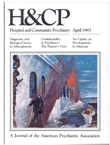Aftercare of Schizophrenic Patients: Pharmacotherapy and Consistency of Therapists
Abstract
Fifty-seven chronic schizophrenic patients were followed an average of six years after index mental hospital admission and compared on the variables of depot fluphenazine (N=26) versus oral antipsychotic medications (N=31), and of consistent aftercare with one therapist (N=17) versus aftercare with multiple therapists or caregivers (N=40). The patients who bad been maintained on depot fluphenazine scored significantly better on measures of mental status than did those on oral medications, but bad a significantly lower score on work performance. The group with consistent aftercare scored better on self-ratings and time without serious psychotic symptoms, but showed no difference on objective mental status when compared with the multiple-therapist aftercare group. The authors conclude that consistent aftercare and provision of medications that do not require a major commitment by the patient to remain well may make a small but significant contribution to the welfare of the chronic schizophrenic patient.
Access content
To read the fulltext, please use one of the options below to sign in or purchase access.- Personal login
- Institutional Login
- Sign in via OpenAthens
- Register for access
-
Please login/register if you wish to pair your device and check access availability.
Not a subscriber?
PsychiatryOnline subscription options offer access to the DSM-5 library, books, journals, CME, and patient resources. This all-in-one virtual library provides psychiatrists and mental health professionals with key resources for diagnosis, treatment, research, and professional development.
Need more help? PsychiatryOnline Customer Service may be reached by emailing [email protected] or by calling 800-368-5777 (in the U.S.) or 703-907-7322 (outside the U.S.).



